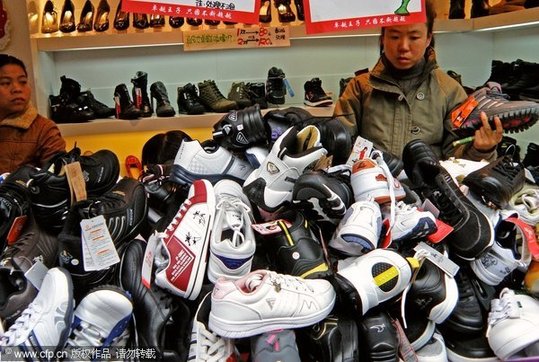Shoemakers adjust amid EU anti-dumping dispute
When the Chinese government challenged the European Union's anti-dumping policies against Chinese-made shoes, Wang Zhentao, president of Chinese shoemaking giant Aokang Group, was pleased.
"It is good the government asked for consultations within the World Trade Organization (WTO) framework. The government's move brings us confidence and strength," says Wang.
Last December, the EU decided to extend its anti-dumping duties of 16.5 percent on China's leather footwear imports for another 15 months.
The Chinese government filed a complaint with the WTO on Feb. 4.
China said the EU had imposed quota restrictions on imports of footwear from China "for almost a decade" and requested mediation under the WTO dispute settlement procedure.
As the first Chinese shoemaker to begin proceedings at the EU Court, the 45-year-old Wang immediately urged the government to launch an appeal in the WTO against the EU duty extension.
"We should stand up, express ourselves, and argue on the basis of reason," Wang says.
Wang lost a lawsuit in Europe against the EU's 2006 anti-dumping duties after the EU's tariffs extension on Chinese-made leather shoes.
Wang started his shoemaking business in 1988. With 30,000 yuan (about 4,400 U.S. dollars) he opened a shoemaking shop in the coastal city of Wenzhou, in east China's Zhejiang Province.
Twenty-two years of hard work later, he had turned the shop into the country's largest private footwear manufactory with more than 20,000 employees, and an annual production capacity of more than 20 million pairs of leather shoes. One fifth of his shoes are exported to Europe and North America.
"We don't export our shoes at a price below our costs, nor do we get subsidies from the government," argues Wang. "It would be completely impossible for me to run such a large-scale company that way."
He sees no legitimate reason for the EU to continue the anti-dumping duties, which were originally vetoed by the EU member states in a non-binding vote in November 2009. But Germany, Austria and Malta later changed their positions amid heavy lobbying by the European Commission.
"The EU decision will only damage our EU clients' interests. European consumers will have to pay higher prices for their shoes. It helps nothing but adds to the sales misery of Europe amid a sluggish economy," says Wang.
"I don't understand, neither do our EU partners."
Wang's strategic cooperative partners in Europe include GEOX and VALLEVERDE.
 0
0 








Go to Forum >>0 Comments